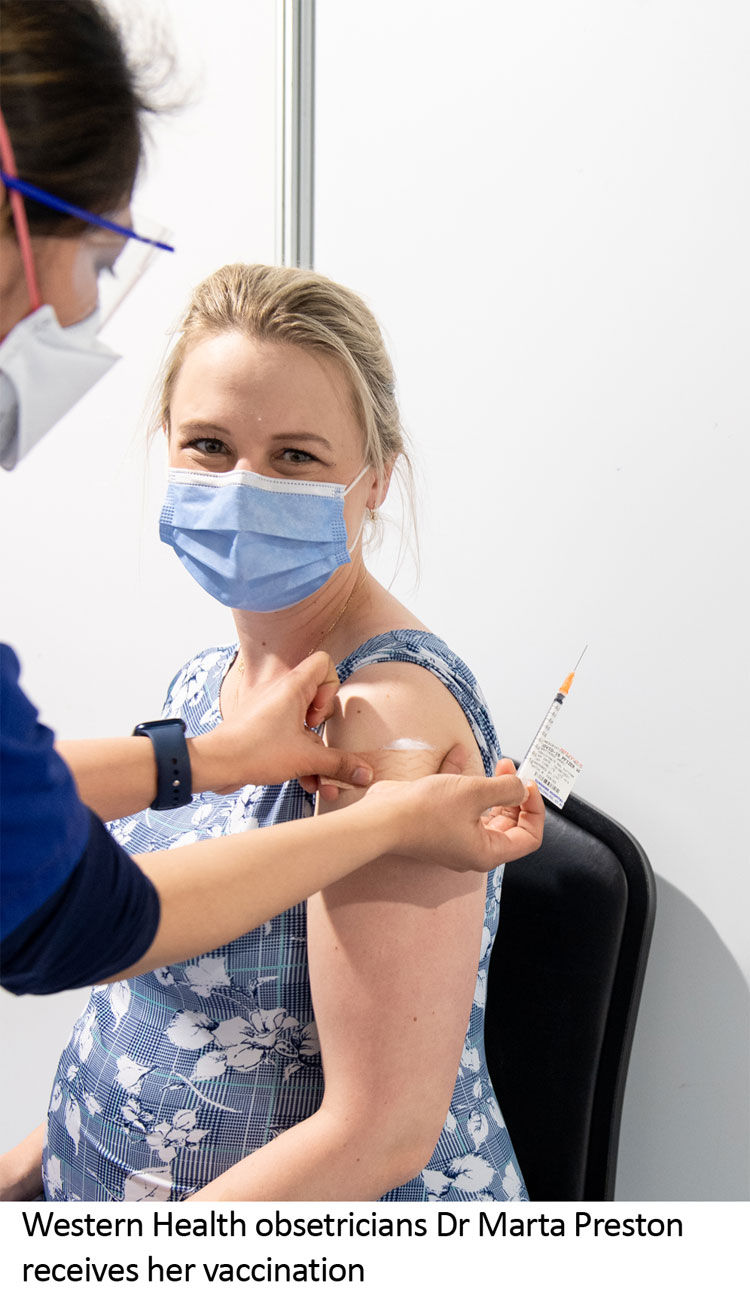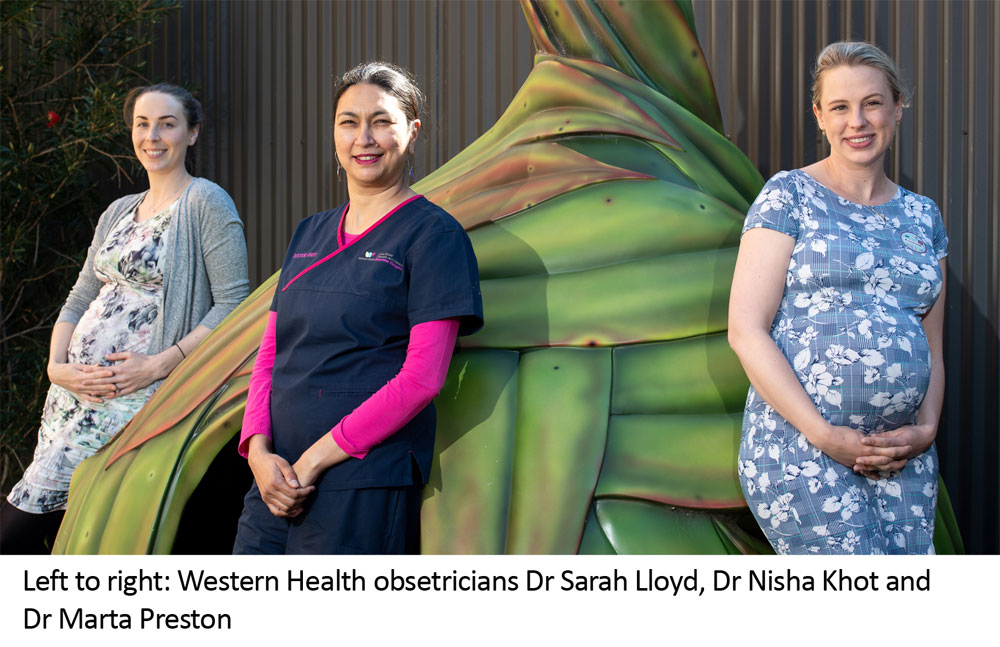Any day now Dr Marta Preston’s first child could be welcomed into the world.
It’s a source of great excitement, especially now that the Melbourne mother-to-be knows she has done all she can to protect herself and her baby from COVID-19.
Dr Preston was so determined to get a COVID-19 vaccine that when medical experts added pregnant women to the list of people prioritised for Pfizer (Cominarty), she raced to book the first available appointment—even though it was on the other side of the city.
“My main motivation was wanting to protect my baby, myself and my community,” Dr Preston said.
It was with great relief that, at 36 weeks pregnant, she received her second dose of Pfizer.
Dr Preston is an obstetrics and gynecology registrar at Joan Kirner Women’s and Children’s at Sunshine Hospital.
She knows all too well the benefits of vaccinating pregnant women against influenza and whooping cough.
“I know that there are people out there who are vaccine hesitant, or otherwise misinformed, and I will have to interact with them in my life and I want to do everything I can to protect myself and my baby.
“I also want to protect my community and my patients.”
Before beginning maternity leave, Dr Preston said many patients were keen to talk to her about the coronavirus vaccine.
“I remember one of the women I spoke to said that I was the first person who she had spoken to who was really positive about the COVID-19 vaccine.
“I think it helps that they could see that I was pregnant and they could see me as a reflection of themselves.
“Many of these women would ordinarily go out and get the vaccine, but because they were pregnant there was a layer of anxiety, which I helped try to dispel by sharing with them the evidence that Pfizer is safe and effective during pregnancy.”
 Western Health obstetrician Dr Nisha Khot said contracting COVID-19 during pregnancy was dangerous for both mothers and their babies.
Western Health obstetrician Dr Nisha Khot said contracting COVID-19 during pregnancy was dangerous for both mothers and their babies.
“We now know that the two mRNA vaccines- Pfizer and Moderna (which will soon be available in Australia) are safe at any stage during pregnancy.
“Getting COVID-19 in pregnancy is not- it is dangerous for both mother and baby.
Dr Khot, who is also a Royal Australian and New Zealand College of Obstetricians and Gynaecologists (RANZCOG) board member elect, said women who contracted coronavirus during pregnancy had a higher risk of being hospitalised, admitted to intensive care and were more likely to require breathing support.
COVID-19 also increases the risk of premature birth and the likelihood that a newborn will require specialist medical care.
Dr Khot said the majority of her pregnant patients were receptive to discussing the benefits of COVID-19 vaccines during pregnancy and breastfeeding.
“Many women are still unaware that there is now evidence that the mRNA vaccines- Pfizer (Cominarty) and Moderna- are both safe in pregnancy.
“It is natural for people to be suspicious when eligibility changes, but public health recommendations are being updated as safety evidence emerges and part of my job as an obstetrician is to ensure that I am sharing reliable, evidence-based information with patients.”
Dr Khot urged Victorian women who are pregnant to consider booking their vaccine today.
“We don’t want women to be rushing out to get vaccinated when COVID-19 is at our doorstep because it will take up to six weeks between their first and second dose and a further few weeks after the second dose to develop the highest level of immunity.
“The time to get vaccinated and protect you are your baby is now.”
ARE YOU PREGNANT OR BREASTFEEDING?
Your questions answered by our expert Dr Nisha Khot, a Western Health obstetrician and Royal Australian and New Zealand College of Obstetricians and Gynaecologists (RANZCOG) board member elect.
Why should I get the COVID-19 vaccine during pregnancy?
If a pregnant woman is infected with COVID-19, real-world evidence shows it can have serious implications for their health and the health of their babies. By getting vaccinated you are protecting yourself and your baby from a range of risk.
Pregnant women who contract COVID-19 have an increased risk of needing to be admitted to hospital, a higher risk of being admitted to intensive care and an increased risk of being put on life support.
Pregnant women who are over 35, overweight or obese, have high blood pressure or diabetes (type 1 or 2) are more likely to develop severe illness from COVID-19 than other pregnant women.
Contracting COVID-19 also increases the risk of your baby being born prematurely and makes it more likely they will need to be admitted for specialist newborn medical care.
Is the COVID-19 vaccine safe during pregnancy?
Yes. Pfizer (Comirnaty) and Moderna (Spikevax) have been shown to be safe in pregnant women based on real-world data from other countries.
When is the best time to get a COVID-19 vaccine if I am pregnant?
You can receive your vaccine at any stage during your pregnancy. It doesn’t matter what age you are either— pregnant women are being prioritised to receive Pfizer. Make your appointment today by calling 1800 675 398, or book online: www.coronavirus.vic.gov.au/book-your-vaccine-appointment.
I’m breastfeeding- is it safe to get the COVID-19 vaccine?
Astra Zeneca and Pfizer (or Moderna when it becomes available in Australia) are safe to receive while you are breastfeeding.
Will receiving the COVID-19 vaccine during pregnancy protect my baby from contracting the virus?
There is good emerging evidence that vaccinating in pregnancy, as well as when you are breastfeeding, means that you will pass on a level of immunity to your baby.
I’d like some more information about the vaccine and pregnancy, where can I find reliable, scientifically accurate information?
You can talk to your pregnancy care team, whether that’s your GP, midwives or obstetrician. The Australian Government also has a decision guide for women who are pregnant, breastfeeding or planning pregnancy.
